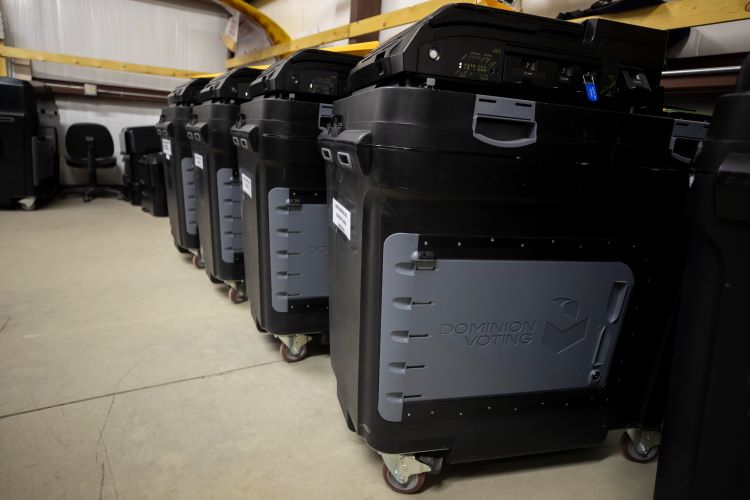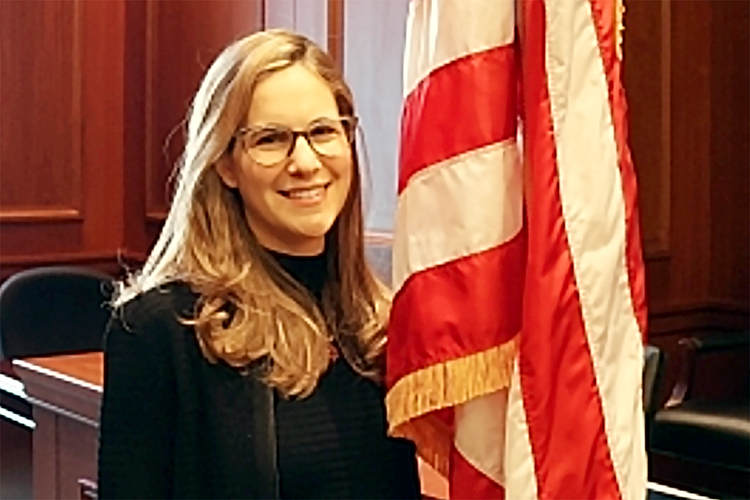10th Circuit upholds sanctions for lawyers who filed election suit on behalf of every US voter

Dominion Voting Systems ballot-counting machines are lined up at a warehouse during a testing of election equipment in Estancia, New Mexico, in September. Photo by Andres Leighton/The Associated Press.
A federal judge had the inherent power to order sanctions against two lawyers for their lawsuit alleging that a voting machine company, Facebook and other defendants violated the constitutional rights of every person registered to vote in the 2020 presidential election.
The 10th U.S. Circuit Court of Appeals at Denver upheld sanctions of nearly $187,000 against lawyers Gary D. Fielder of Denver and Ernest J. Walker of Benton Harbor, Michigan. They had sought $160 billion in damages in their suit.
The 10th Circuit’s nonprecedential Dec. 13 decision is here.
A federal magistrate judge had tossed the suit because the voter plaintiffs asserted generalized grievances, rather than particularized injury. The sanctions covered attorney fees by the defendants—Dominion Voting Systems, Facebook Inc. (now known as Meta Platforms Inc.), the Center for Tech and Civic Life and government officials in Michigan and Pennsylvania.
The suit had alleged a “vast conspiracy” among the defendants to interfere with the 2020 presidential election through an effort to change voting laws, use unreliable voting machines, alter votes, count illegal votes and suppress the speech of opposing voices, according to the magistrate judge’s April 2021 opinion.
The 10th Circuit said the sanctions could be imposed under the judge’s inherent power and a federal law allowing fee shifting when a lawyer multiplies legal proceedings unreasonably and vexatiously.
The lawyers’ arguments regarding standing “were so inadequate” that the trial court was justified in concluding that the suit claims were made in bad faith, vexatiously, wantonly or for oppressive reasons, the appeals court said.
The appeals court also rejected an argument that the sanctions violated the lawyers’ First Amendment right to speak and petition the government.
“In the circumstances of this case, where the plaintiffs’ arguments regarding standing and personal jurisdiction were utterly baseless, the attorneys have failed to establish that the district court’s sanctions violated their First Amendment rights,” the 10th Circuit said.
Fielder’s office gave this statement to the ABA Journal: “From the beginning, we thought that the proper mechanism for relief against private companies and persons that interfered with the 2020 presidential election was through a class action/civil rights lawsuit in federal court. Mr. Walker and I spent thousands of hours researching and preparing the pleadings. Before the case was dismissed, we never requested more time to file a motion or response and always held ourselves in honor. Particularly in light of the recent revelations with regard to the level of participation between state actors, major political parties, so-called private companies and social media outlets, we thought that voters had standing to bring claims under Section 1983.
“Never did we think that our actions were unethical or frivolous. We were representing voters from across the country and, now, fear that the affirmation of the sanctions imposed against us will have a chilling effect on other lawyers from representing people in the future in cases such as these. Of course, we will file for a rehearing in the 10th Circuit and review in the Supreme Court if necessary.”
Walker did not immediately reply to an email listed in litigation records or to a voicemail to a number listed in the litigation and Michigan bar records.
Hat tip to Law.com and Reuters, which had coverage of the decision.
Write a letter to the editor, share a story tip or update, or report an error.



